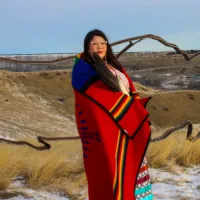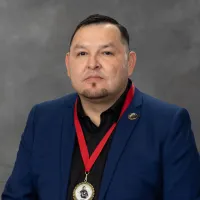Indigenous Health
Indigenous Health
Students in this exciting program work to become creative, skilled, culturally competent, committed, and passionate about creating a more inclusive, equitable society for all.
You will learn about historical and contemporary causes for health inequities in areas such as water and food security, diabetes, addiction, and mental wellness; and have the opportunity to learn about traditional Indigenous teachings and contemporary perspectives by engaging with Elders, knowledge keepers, health care professionals, and other Indigenous peoples. You will have the opportunity to develop your skills in a community setting by engaging in a practicum in partnership with rural and urban Indigenous communities.
Major topics in the Indigenous Health major include traditional Indigenous health concepts, creating healthy communities, preventing disease, creating and evaluating health programs, and conducting health research. The knowledge you develop will be transferable to organizations and communities as they respond to critical health issues facing Indigenous peoples and all Canadians.
Program Planning GuidesContact an Academic AdvisorAdmission & Application Information
The Program Planning Guide (PPG) outlines the courses required to complete the program, along with a sequencing plan. You should keep your Program Planning Guide up to date and refer to it for course registration and general program planning.
See ulethbridge.ca/ross/ppgs. Your calendar year will be the year of your most recent admission to uLethbridge.
It is normal to feel apprehensive when selecting electives! This is your opportunity to step out of your comfort zone and learn about a topic outside your major. Understanding that this can feel risky, the university permits students to request they receive credit (CR) instead of a low or failing grade in an elective outside of their faculty. This request must be submitted before the credit/non-credit deadline a few weeks after classes begin! For more information, please refer to the Academic Regulations section of the Academic Calendar. The form for making this request can be found on the SEARS website.
To aid you in your selection, we have put together a list of suggested electives that can be used to meet the science liberal education requirement. These courses are recommended for students in their first or second year of study. Check the timetable for course availability and prerequisites. Some courses may only permit out-of-faculty students to register on the first day of classes. In this case, register for a backup course and continue trying to register for your preferred course.
Introductory Science Elective Options
- NEUR 1000-Introduction to Neuroscience
- GEOG 1000-Introduction to Physical Geography
- ARKY 1000-Introduction to Archaeology
- PSYC 2005-Psychological Sketches: Straight from the Researchers
- PSYC 1010-Introduction to Psychology A: Evolution, Mechanisms, and Cognition/Perception
- CPSC 1000-Introduction to Computer Science
- NEUR 2300-Core Brain Story
- LOGI 1000-Critical Thinking
Indigenous Health majors are required to complete a full-time, 13-week practicum placement as credit toward their degree.
Applicants to the Indigenous Health major who have previously completed an approved undergraduate degree with a minimum GPA of 2.00 will have the opportunity to complete an individualized 20-course program in just two years. Prospective students must apply for admission prior to receiving a personalized program plan.
Applicants to the Post-Diploma program must have a minimum diploma GPA of 3.00 on the University of Lethbridge 4.00 scale. If you are considering applying to the program with a diploma GPA below 3.00 (but not less than 2.00), you may be considered for admission if you have extensive practical experience in a relevant field.
The Faculty of Health Sciences will consider diplomas in other areas of study on a case-by-case basis.
The Faculty of Health Sciences' commitment to Indigenous students remains a central feature of its programming. Support services are offered to Indigenous students in all programs in the Faculty of Health Sciences. Our Indigenous Learning Facilitator, Sianna Cherweniuk-Hummel, can help you access resources, support, and more. Visit ulethbridge.ca/healthsciences/fnmiservices to learn more.
Graduates of this program will have the ability to navigate between differing models of health and care using culturally safe practices. Graduates will have the skills to seek out careers in health promotion and disease prevention, program and policy development and evaluation, community-based research, community outreach, cultural broker/health advocacy, and wellness counselling, among other areas.
After completion of the program, graduates may find employment in a job such as:
- Indigenous Health Coordinator
- Aboriginal Health Representative
- Community Liaison Worker
Visit uLethbridge Career Bridge to learn more about career pathways after graduation.
Our stories

I chose the Indigenous Health Program at the University of Lethbridge because of the longstanding academic reputation of the institution, paired with the close relationships with neighbouring Indigenous communities and members. The program allowed me to utilize two-eyed seeing (using the lens of both Indigenous and Western ways of knowing) in the classroom as a student and as a critical thinker for the innovative change that is required in our health systems. What I did not anticipate was the healing, the path to self-awareness and the regaining of the warrior spirit that would go hand in hand with the journey. I found a place I belonged; I filled my cup with the power of knowledge from each professor, while honouring the invaluable insights of each Indigenous Elder in the classroom. I cannot thank faculty, advisors, Elders and the dean enough for the support and opportunity they gave me as a student, a mother, a researcher and a student-curriculum committee representative as they pushed me to seek every opportunity that was presented to me. This program is the medicine I think everyone should experience.
Amelle Weasel Fat

This program was appealing to me because I have worked with my people for the past 13 years and I needed more history behind my people’s health issues. I came across this program online, and after my first year it caused an awakening of realization when it came to the health of many of my clients I have helped during my time as a nurse on my own reserve. The topics covered in my first year of studies were eye opening and gave more understanding on how things can be solved when it comes to Indigenous Health issues on and off reserve. By taking the initiative to learn about my own people across Canada, I have invited the two-eyed seeing approach into my work practices as a current nurse. The classes offered are very informative with great instructors who take the time to help you process/understand the history of Aboriginal People all over Canada, and they care about what they are teaching to their students. The topics covered are not always pleasant to hear about, but the instructors are compassionate about seeing change in contemporary issues Aboriginal People face and deliver up to date information with a gentle heart that change can happen. As a current student I would 100% recommend this program to further your education, as it is a definite asset to my education within the health care field or any organization providing services to Aboriginal People.
Vanessa Ahenakew

After graduating from the Indigenous Health Program at the University of Lethbridge, I was hired by Red Crow College under the Post-Secondary Student Support Program (PSSSP) as a Student Counsellor. For two years, I supported Blood Tribe post-secondary students by helping them navigate their educational pathways, assisting with funding applications, and providing wellness counselling. During this time, I also ran for and was successfully elected to the Blood Tribe Department of Health Board of Directors as a Class A Community Representative. In November 2024, I was honoured to be elected to the Chief & Council of the Kainaiwa/Blood Tribe. As a Councillor, I continue to serve as the Council Representative on the Blood Tribe Department of Health and contribute to our Tribal Government and External Affairs pillar. My Health Sciences degree has significantly advanced my career by equipping me with the knowledge needed to advocate for the health of my Nation across key areas such as epidemiology, mental health and addictions, and overall community wellness. The Indigenous Health Program plays a critical role in preparing future students with sound, ethical, and culturally relevant knowledge to support First Nations communities and address the ongoing health challenges we face.
John Little Bear
